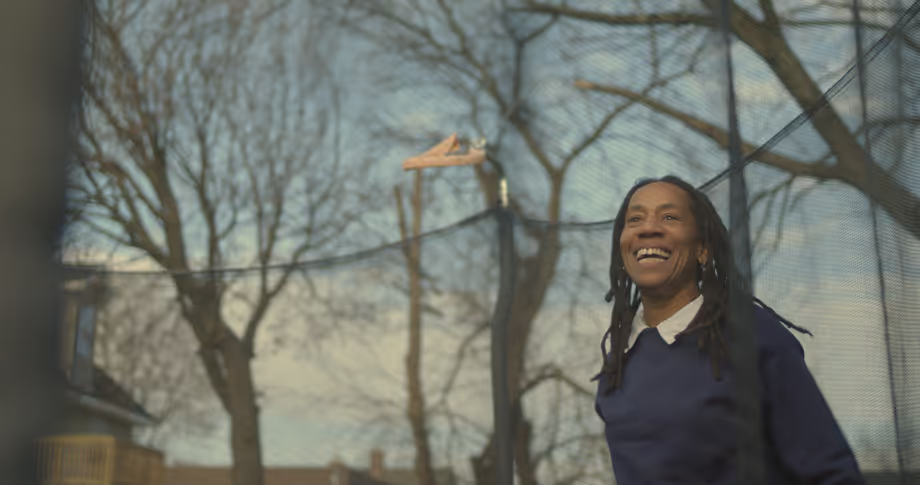I'm Free, Now You Are Free Discussion Guide Discussion Prompts
Discussion Prompts

PROMPT ONE: STARTING THE CONVERSATION
Immediately after the film, you may want to give people a few quiet moments to reflect on what they have seen. You could pose a question based on the options below. Some of these will require participants to engage by first doing written reflection. Be sure to provide pen and paper. Give people some time to themselves to jot down or think about their answers before opening the discussion. Alternatively, some prompts ask participants to share with a partner or in small groups to begin processing.
- Free Write for 3 minutes. Write about one scene or idea from the film that resonated with you most. Why did you identify with this scene? Read what you wrote to a partner.
- Process how you are feeling after viewing the film in any creative way that resonates with you. Consider words or memories that relate to this feeling. Process by writing a poem, drawing, etc. Share creative reflections in small groups
Policing and Prisons
This film is, in many ways, about policing but does not depict any police violence. What do you think about this choice on the part of the filmmakers? Is it necessary to depict, or show scenes of police brutality, that the violence MOVE members endured to understand? What, if any, effect does the decision to not include these types of representations have on you, the viewer?
What assumptions did you have about the role or affects of prisons before watching this film? How have those assumptions shifted or become more informed?
What does this film teach us about the longstanding effects of policing and prisons in the city of Philadelphia and more broadly? Had you considered the familial, emotional or even spiritual effects of these systems before now?
In this film we gain understanding of how incarceration impacts those who are not behind bars, and more specifically the family members who are waiting for their loved ones to regain their freedom. What does the title, “I’m Free, Now You are Free” suggest about the many ways incarceration impacts those who are waiting for their loved ones to be released?
Storytelling & Family Memory
What did you notice about the moments when Mike and Debbie shared their stories with one another? How did they sound, look or act? How were they captured by the camera? Why was their testimony conveyed in this way and what did it allow you to infer about their relationship?
Debbie, Mike and his daughter, Aliya, collect home video in the film, in addition to retelling their memories of living through Debbie’s incarceration. How did or does your family preserve family histories? Why is this important? What are some ways you can continue to pass down enjoyable and challenging family stories and memories?
Much of the film revolves around Mike and Debbie being interviewed. They give their own personal testimonies about their experiences during Debbie’s incarceration. In some of these moments they are on camera, and at other times they are omitted from the frame, with only their voices present. What do these cinematic choices convey about memory? What does it convey about the role of retelling and memory for families living through state violence? How does the state’s violence affect their ability to retell and recall their experiences? How has state violence affected your ability to remember or retell your own life experiences?
Reflect on being a child and/or parent. Write down one apology you wish you had heard and one you wish you had given to your parents or to your child? To your knowledge, what were some barriers to these? Write the apologies you need/needed to hear.
Where did you identify places of anger and hurt in this film? How did Debbie and Mike express hurt, but also make amends? What apologies do you need to give from family, friends or community? What serves as a barrier for you to give them?
What is the importance of familial play in this film and why? What playful or lighthearted moments or symbols were present? How were you impacted by Aliya’s presence in the film?
According to a 2021 Report from The Sentencing Project, “Black Americans are incarcerated at 5 times the rate of white Americans in the United States,” and over half of all women in US prisons and 80% of women in jails (including those who are awaiting trial behind bars because they can’t afford bail). What are some of the effects of incarcerating mothers that you can glean from the film? How did incarceration affect the level of intimacy and care we saw in the film? Imagine some alternatives to incarceration for mothers and/or pregnant women that can support their abilities to care for and protect their children and themselves?
Cities, Neighborhoods & Displacement
Reflect on the moments in the film when Mike Jr. is walking down former streets in West Philly. The first is the site of the Powelton Raid, the second the site of the MOVE bombing, and the third the street his mother grew up on. How do these parallel scenes tell us about those spaces and what MOVE members experienced there? What similarities or differences did you notice across the scenes?
How has your childhood home place changed over time? How have police and/or developers affected change in the place you consider or considered home, if at all? How are people in the community affected?
Today, the former sites of MOVE’s homes that Mike Jr. visited are home to university dorms (Powelton) and redeveloped homes (Osage). How do you see gentrification and displacement playing out in your neighborhood? How do you contribute to gentrification and displacement?
Optional: CLOSING QUESTION/ACTIVITY
At the end of your discussion, to help people synthesize what they’ve experienced and move the focus from dialogue to action steps, you may want to choose one of these questions:
- What will you remember most about this discussion? How has it transformed your ideas about the issues of the film?
- Present one question that the discussion brings up for you.
- Fill in the blank. This discussion makes me want to take action by doing ____________________ !
- What do you want to learn more about since viewing the film?
- “I’m Free, Now You Are Free” Group Closing: This activity is about thinking through the meaning of freedom, not only as a personal endeavor but as something communal, familial and necessarily shared! Answer the following question on a notecard: What does freedom mean to you. Describe or envision it as best you can based on your own personal ideals. Post your card up in a central location with everyone else's in the group. Now read the responses of others. As a group, take turns discussing what resonates with you about someone else’sidea of freedom.
Optional: TAKING ACTION
If the group is having trouble generating their own ideas for next steps, these suggestions can help get things started:
Learn & Remember:
- Research more about MOVE history and about the release of Debbie and Mike Davis Sr. in 2018. You might start with other MOVE films like The Bombing of Osage Avenue(1985) or 40 Years A Prisoner(2020).
- Independently research more about Black political prisoners who are still incarcerated from the 1970s and 80s Black freedom struggles
- Interview a woman in your family about an experience they had with state violence or with unfreedom more generally. Record the interview and discuss it with them further. Continue to archive your family or community history with injustice especially.
Imagine Beyond Prisons & Police
- Write a supportive and encouraging letter to a political prisoner in Pennsylvania or in your area.
- Donate to the Philadelphia Community Bail Fund, specifically the annual Black Mama’s Day Bailout fund that is prioritized leading up to Mother’s Day. Or find and support your local community bail fund.
- Imagine small scale alternatives to calling on police on your street or in your neighborhood. Organize a gathering with a collective of trusted and like minded people to brainstorm and build support neworks locally. Consult abolitionist resources and toolkits provided by Critical Resistance.
- Develop a fund for re-entering women or mothers in your local area. Or develop a community aid fund to support the re-entry of an incarcerated person in your community or area.
- Support an organization that helps incarcerated people in your area receive family visits and support services
- Host a Curb Fest for Political Prisoners in your area. Established in 2021 in Philadelphia, Curb Fest connects organizers with community members to raise awareness of political prisoners and share ways to get involved in the movement.
